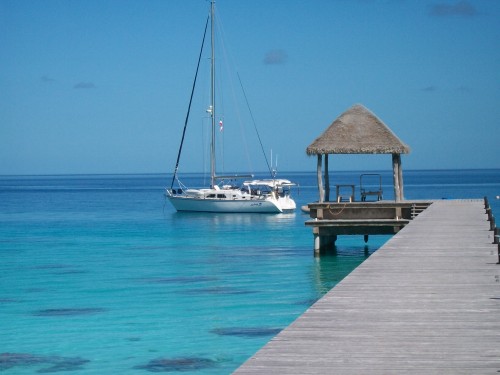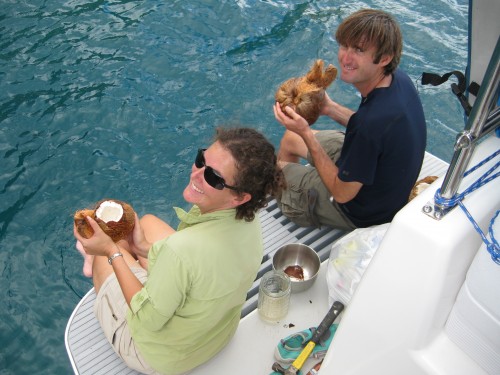What are the three biggest unavoidable expenses of Travel?
1) Transportation
2) Accommodation
3) Food
Now what if, in order to not pay the first two, you were forced to spend your days in tropical splendor visiting the remote places completely inaccessible to common travelers? Places that see, maybe, 100 “outsiders” in a year? These are simply not places you can get to any other way but on a small sailing yacht. You don’t have to use your own boat though. You can crew for other people.
“Now wait” you’re saying, “Don’t I need some sort of license or something to work as crew?”
It actually really depends. To work as employed crew or as a captain on a vessel (to get paid) yes you do. This kind of work is typically found in the Caribbean & Mediterranean seas and with the larger yachts. We go into the world of paid crewing in other parts of this blog.
There is, however, another type of crewing out there. One that requires no certification or even very much experience. Every year thousands of yachts from 30 – 75 feet long quietly sail around the world to some of the worlds most amazing destinations: Mazatlan, Fakarava, Tahiti, Bora Bora, Niue and New Zealand are just a few of the places you can go. Many of these smaller ships are run by either singlehanders (people sailing alone) or married couples on the vacation of a lifetime. Well, as you can probably guess, having 1 or 2 people stand 24 hours of continuous watch each and every day for weeks on end while the ship is transiting, not to mention handling all the cooking, cleaning, driving, boat chores, etc. does not a perfect vacation make. Many of these casual sailors want help but really don’t have the budget to pay a professional crew or the desire to relinquish command of their vessel to a charter captain. All they really want is a spare pair of capable hands attached to someone who is reliable and easy to get along with…and that’s where the world of volunteer crewing comes in. Think of it as WWOOFing, except replace the farm animals with a sailing yacht.
The basic deal is this: you provide your time and energy and the captain provides the ride and gives you a place to sleep. You share costs. At this point, things get a little fuzzy. As you might expect in a volunteer situation, the details vary from boat to boat. Typically you should be looking for a boat to provide a bunk for you and normally the only “expense” you share is food costs split evenly into shares for everyone onboard. Some boats share gas costs. Ultimately, it’s whatever you and the captain agree on as fair and reasonable.
Two big things to remember here:
1) Volunteer crewing comes with no contracts and no guarantees but tons of opportunity. You work for the Captain as long as the two of you want to work together. You also get little to no say about where you go or how fast you get there, though you should be informed before you depart. If you’re operating on a specific schedule or have a limited time table, this may not be for you but if you’re in the mood to take a few months and “see where the wind blows” you may be surprised where you end up!
2) You are responsible for your safety! You need to make sure you choose a boat that *should* be safe, baring any unforeseen circumstances. Boats with lots of standing water in the bilge, rusted rigging, owners who are new to sailing – all of these should be red flags that maybe you don’t want to sail with them. Use common sense. When you get on a boat you’ll be isolated for days at a time in the middle of the ocean, literally miles from land, with the other people on the boat. Are you comfortable with these people and this ship? Also, though experience isn’t necessarily required, it is without a doubt a very good idea to have some idea what you’re doing, or at least know enough to know when something is wrong.
So how does a land-lubber get themselves a ship? Well, first things first: start small. You do not want to be on your second day of a 30 day sail to French Polynesia when you discover you get violently seasick! (and in case you’re worried about that, here’s some info on seasickness.) If you have some money, take some sailing classes. If not, get onto a local volunteer racing team or sign up to crew for a shorter sailing rally. Most sailors are willing to share what they know. The two best ways to get on ships are to meet captains by being a part of the community and use internet crewing boards.
One article really can’t cover all the nitty-gritty details of how to find a boat to take you around the world, so if you think this might be for you, our blog covers how we do what we do. Also, feel free to drop us a line and we’ll be glad to help you out in any way we can!
Originally published for Do It While You’re Young – www.DIWYY.com
For more on how to sail the world for the cost of groceries, click on “How to Crew”
Visit “Sailing and Seasickness” for more information on dealing with Mal de Mer
About the authors
Greg and Tiffany are travelling around the world on sailing yachts and keep a video blog of their (mis)adventures. If sailing to Tahiti on a 44 ft sailboat, getting pooped on by seagulls, opening coconuts with dull machetes, sailing past tornadoes and ukulele Christmas carols are for you, then check them out at www.CoastGuardCouple.com!





I’d love to do this. It’s just a matter of convincing my wife, Ashley. Unfortunately, she suffers somewhat from the violent seasickness. Any chance she could outgrow it if she sat a boat long enough?
The #1 asked question / objection.
The short answer Mike – Yes.
We’ll write an article for the long answer and how Greg overcomes his seasickess in our next how to crew article.
Hey guys,
Randomly found your site while surfing the net about volunteer crewing… It’s amazing and I LOVE what you are doing – mad props! =] My boyfriend and I are also an American couple traveling/working our way around the world. We ventured across the states for 7 months and jumped abroad 14 months ago (how time FLIES!). We are currently in Seychelles and found what seems to be an amazing opportunity to join a 22 meter steel ketch from Madagascar with planned stops in the Maldives, Indonesia, and Malayasia, to finally reach Thailand (an estimated 2-3 month journey, says the Skipper). We both have a basic knowledge of sailing, but have never done something like this – although the Skipper mentioned that would be fine. I’ve been endlessly searching for some the internet to find sort of norm guidelines as to how “volunteer crewing” works (especially since we’ve been asked to pitch in for food, generator, fuel and port fees – although we were able to work out a deal since my boyfriend can help the boat owner with his website) . Your blog has been extremely helpful so far, and you guys seem really easy going so when you said to drop you line at the end of your post I figured I’d take you up on it! I would really like to rack your brain for a bit with some details about our potential journey to see what you think since you guys are quite experienced with this kind of thing… Can we chat via email?
but of course, check your inbox.
hi guys, love the sound of your lifestyle, i came across your website looking for vacancies from new zealand to the usa as a volunteer, and as of yet this has been the most useful source by far. was wondering whats the best way to find yatchs that are leavinf from new zealand? it is phone up the docks themselves? thanks alot for your website and sharing your experiences, kind regards adam
Hey Adam,
Why would you want to leave New Zealand?!?
– We have a few rallies from NZ & Aussie listed over on our Races and rallies page. Here’s the link:
https://coastguardcouple.com/how-to-crew/races-rallies-and-sailing-schools/
– Calling up docks & yacht clubs and asking about “races” and “rallies” is a good idea. Explain who you are and what you’re looking for. Most boat groups are helpful folks.
Hello,
Thank you for all your info, what an exciting way to travel.
My boyfriend and I are wanting to do some crewing in the carribean. From Belize heading southward. Or from any country really but heading south. We’ve looked on some of the websites you mentioned but haven’t found anything. Do you think that being at a marina and asking around will work? Any tips on which marinas? If you could email me with any tips that would be ace.
Thanks
Claire
I’m not familiar with that area, so I don’t have any specific recommendations for you. Going to the marinas and asking around will be one of the best ways to find something. Also, find out where all of the sailing people hang out in town, and attempt to meet them in a social situation. If they are comfortable hanging out with you, they’ll be much more likely to invite you onto their boat.
Good luck!
Tiffany
Cool idea. It sounds like a brilliant experience and a great lifestyle
It has been amazing!
I’m speechless. What a lifestyle!!! It’s fantastic. How long have you been sailing?